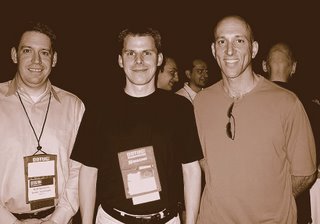Before noon, I did some XML hands-on sessions. Just like the 10g Dev NF session of the day before, it was too basic for me. But it was a fine refresh of the things I already knew.
At noon I tried to watch the Brazil game, but in the US they had some satellite problems, so it was a bit a pain! The burger I eat was way too much! These portions in America are so *big*!!
 In the afternoon I saw a really interesting and high-level presentation by Toon Koppelaars. The title says it all "Applied Mathematics for Database Professionals/Practitioners (AM4DP)".
In the afternoon I saw a really interesting and high-level presentation by Toon Koppelaars. The title says it all "Applied Mathematics for Database Professionals/Practitioners (AM4DP)".It was a high level session, braked in three parts:
1. The Maths: Mathematical concepts; do you recognize the symbols on the picture?
This was about defining the logic (predicates and proposition, logical connectives, quantification and rewrite rules) and setting the theory (predicative specification, (set) Functions, Powerset and Generalized product)
"Logic is an analytical theory of the art of reasoning whose goal is to systematize and codify principles of valid reasoning whose goal is to systematize and codify principles of valid reasoning. It has emerged from a study of the use of language in argument and persuasion and it is based in the identification and examination of those parts of language which are essential for these purposes." -- Robert Stoll, Set Theory And Logic, Dover Pub., 19632. The Application: Apply concepts to the data model (including integrity rules)
Set theory and logic can be used to model databases. Modeling databases = modeling data integrity constraints (attribute values sets, tuple constraints, table constraints, database constraints and transaction constraints)
3. The Real World: implement the data model and guidelines for a strategy
So how did Oracle implement all this? Does this ring a bell: tables, check constraints, primary, unique and foreign keys, ...
I learned that I must think about a lot more than I did before when I'm creating a database model!
Database modeling = constraint modeling: it's all applied logic and theory (non-ambiguous) and constraint implementation!
 After the BI summit, where Mark Blog'd about, we had a welcome reception! Although we only got two drink coupons, it was fun ;-) You could easily speak with all the famous "Oracle" people. I really liked the chats with Scott S., Steven F., Mogens N., Roger D. and the Danish and AMIS guys.
After the BI summit, where Mark Blog'd about, we had a welcome reception! Although we only got two drink coupons, it was fun ;-) You could easily speak with all the famous "Oracle" people. I really liked the chats with Scott S., Steven F., Mogens N., Roger D. and the Danish and AMIS guys.In real world we (Scott Spendolini, me, Steven Feuerstein) look better than on the (original) picture ;-) It's my camera that's not doing it's job very well, so I made it b/w.
The pictures of Sunday you find here.
No comments:
Post a Comment